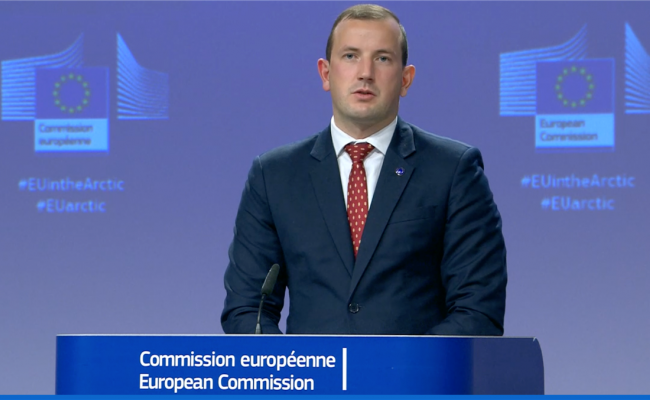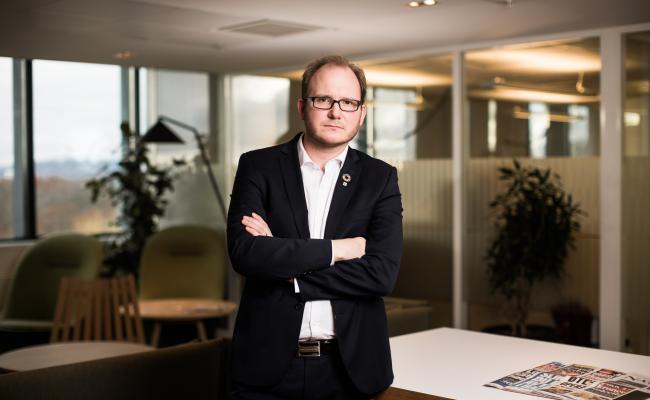The Arctic Circle Assembly The AEC on the EU Arctic Policy: “Leave Arctic Business to the People who Live Here”
The panel about business in the Arctic quickly turned into a discussion about the new EU Arctic Policy during the Arcic Circle Assembly 2021 in Reykjavik. Speakers included Jeppe Kofod, Minister for Foreign Affairs Denmark, Aaja Chemnitz Larsen, Chair of Arctic Parliamentarians Danish Parliament, Michael Mann, EU’s Special Envoy for Arctic Matters, Heiðar Guðjónsson, CEO, Sýn; Deputy Chairman of the Arctic Economic Council, and Mads Qvist Frederiksen, Director of the Arctic Economic Council. (Photo: Trine Jonassen)
Icelandic investor and Deputy Chair of the Arctic Economic Council, Heidar Gudjonsson, told the EU to mind its own business – or territory – regarding the EUs new Arctic Policy.
“We have seen big investments in the Arctic being cancelled for the mood of the moment”, said Heidar Gudjonsson, CEO of Vodafone Iceland and chairman of the first infrastructure investment fund in the Arctic, as well as Vice Chair for the Artic Economic Council (AEC).
Gudjonsson's statement was directed towards the new EU Arctic policy presented by the European Commission this week. The EU argues that oil, gas and coal should not be extracted in the Arctic if the climate goals are to be met, in addition to its representing a risk for environmental pollution in vulnerable areas, and calls for an international moratorium on hydrocarbon extraction in the Arctic.
The Icelandic investor called such change in policy “absolute terror for investors”.
“When businesses see uncertainty, they shy away. We need to put down long-term structures”, Gudjonsson said during a debate at the Arctic Circle Assembly in Reykjavik, Iceland on Thursday.
He was supported by colleague Mads Qvist Frederiksen, Director of the AEC, who pointed out that people will lose their jobs if there were to be a ban on fossil fuel extraction.
Not an attack
“The EU Arctic policy is not an attack on businesses in the Arctic. But we aim to stop future drilling”, explained Michael Mann, EU’s Special Envoy for Arctic Matters.
“We would not be credible if we avoided adressing climate change and taking a stand. The EU does not grant drill permits, but we will work towards this with our partners. The policy is a starting point for a conversation. In ten years, we will question why we needed to discuss this at all. Why did we not just do it”, Mann stated.
Heidar Gudjonnson did not look impressed and commented on the missing parts in the newly presented policy;
“We have special way of doing business in the Arctic. One is use of local transportation and consultation. Unfortunately, in the EU policy there was a lack of local consultation. You need to talk to the locals first. How do they view the area?” asked Gudjonsson.
“This is like if the the Arctic Council were to say “we have ideas about how to manage the Mediterranean Sea. You should listen to us, we know best!”, the AEC Vice Chair argued.
Three Arctic nations
The EU’s Special Envoy for the Arctic explained that even if it was not clear from the written document, the EU enjoys a close relationship with indigenous people and the people who live and work in the High North.
“15 years ago, we did not go into the Arctic with sensitivity. But we learned. We have been guilty in the past of not taking note of local consultations. This time we spent a lot of time speaking with the locals and indigenous groups. A lot of energy has gone in to speaking with the locals”, Mann said and proceeded to point out that there are, in fact, three Arctic nations in the EU; Finland, Sweden and the Kingdom of Denmark.
Want to decide
Aaja Chemnitz Larsen, Chair of Arctic Parliamentarians and member of the Danish Parliament, agreed with Heidar Gudjonsson on the right to decide on businesses and investments.
Change in policies is absolute terror for investors.
“Cooperation with USA, the EU and Denmark is good for Greenland. But the outside world cannot define what is important to Greenland. We have to decide this for ourselves. Where should the money come from? Fisheries, mining, tourism?" Larsen asked.
"We have good projects with international investors and have to build on that. It is going to take time, we just have to decide the right path for us”, finishes Larsen.
Governed by the Arctic
Heidar Gudjonsson quietly pointed out that no-one had acknowledged the fact that Greenland left the EU in 1985, due to disagreements about the Common Fisheries Policy and to regain control of Greenlandic fish resources, and subsequently remains outside EU waters.
"Business in the Arctic must be governed by the locals", Gudjonsson stated.
Virginijus Sinkevičius, EU Commissioner for Environment, Oceans and Fisheries, defended the Union's new Arctic policy, saying that climate change in the Arctic affects the rest of the world and that something needs to be done.
“Our prosperity and future generations depend on our fight against climate change. We just do not have a good enough excuse to explain to our children why we did not do more. And climate change can only be addressed through global actions. We will push to keep oil and gas in the ground and we hope that the rest of the European Arctic will be inspired”, Sinkevičius said.
Called for dialogue
The EU representatives met resistance from former Lieutenant-Governor for Alaska, Mead Treadwell, who asked how the EU can support shutting down businesses in the gas and oil industry.
“We are working hard to be more sustainable. It might be better to have a dialogue with the people in the oil and gas industry instead of squeezing us out of business”, Treadwell said from the audience.
Virginijus Sinkevičius answered that it is not the EU that ultimately will shut down oil and gas businesses:
“The increase in temperature and the climate changes will do that. Off course there are a lot of jobs in the oil sector that depend on these jobs. There is a lot of work to be done. With this policy, we are inviting partners to find solutions together”, the Commissioner for Environment, Oceans and Fisheries for the EU said in closing.
EU will keep buying
In a later debate on the same topic, led by High North News´ Editor-in-Chief Arne O. Holm, the editor asked Michael Mann if the EU will stop buying oil and gas altogether, to which Mann´s answer was no.
"We are not going to stop buying oil and gas, no. But we are the leaders in climate action and we are starting to turn the tide. We can not stop using oil and gas over night, but we have to speed it up"
"But the new Norwegian Government will continue using oil and gas", Holm argued.
"Yes, and we want to begin a serious discussion with Norway about this", Mann stated
"How concrete is the oil ban?" Holm asked.
"It is a concrete suggestion to stop drilling. We have made a commitment to push all parties to stop. We will seek an agreement with our parnters over this", said Mann.
Supports the ban
Naaja Nathanielsen, Greenlandic Minister for Housing, Infrastructure, Justice, Minerals and Gender Equality, declared that the Greenland Government would not support further drilling for oil and gas, in line with the EU policy.



